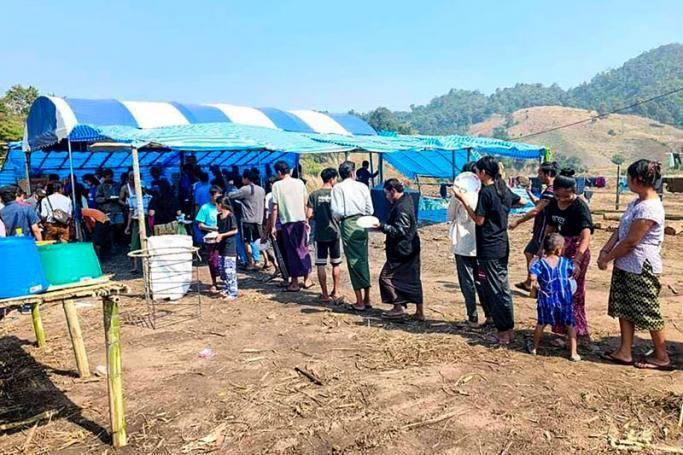A new report out entitled, “Denied and Deprived: Local communities confronting the humanitarian crisis and protection challenges in Southeast Burma,” highlights the serious humanitarian crisis facing people in Karen State.
The report is published by the Karen Human Rights Group (KHRG).
Prevented from seeking refuge and protection across international borders, civilians in Karen State are not only forced to stay amidst the conflict and violence, but are being denied access to lifesaving assistance and essential resources by the military junta, reports KHRG in a press release.
Drawing on interviews with villagers, local leaders and civil society organisations, this report presents the deepening humanitarian crisis in Karen State since the 2021 military coup, highlighting the denial and deprivation of aid to civilians and their right to protection from threats to life and person. The report points to problems of extreme food insecurity, a lack of medicine, health care and education, and constant threats to safety that are a direct result of the State Administration Council’s intimidation tactics and deliberate attempts to cut ethnic areas off from essential resources.
This report also highlights how local efforts and initiatives are currently filling aid provision gaps despite major logistical and security challenges. Drawing on their local expertise, ethnic service providers, local civil society and community-based organisations (CSO/CBOs), and faith-based organisations have been the primary actors responding to the needs of rural villagers, delivering food, shelter and alternative health care and education services, even in displacement. Yet they remain excluded from major funding sources. The report concludes that greater recognition of local communities as the driving agents in their own humanitarian aid solutions is imperative, and that investment in these local channels is the most effective means not just of addressing immediate needs but also of creating more sustainable support mechanisms in the long run.
Ultimately, such solutions will remain partial as long as the military junta remains in power and is allowed to continue its reign of terror. KHRG hopes that this report will permit national and international stakeholders to gain a better understanding of the role of the military junta in creating and sustaining the humanitarian crisis in Southeast Burma. It includes a number of recommendations on how national and international stakeholders can prevent the military junta from exerting decision-making power over relief services, and can reroute funding to local actors, who not only have knowledge and experience with the local context, but have long provided critical support to rural villagers and displaced populations in Southeast Burma.
“There are almost 200,000 IDPs in Karen state and they are caught between the deliberate blocking of aid by the Myanmar military on one side, and lack of funding and bureaucratic red tape stopping aid reaching them from the other,” said Naw Htoo Htoo, Programme Director of KHRG.
KHRG calls on the international community, NGOs, funding agencies and regional and foreign governments to:
Ensure that the SAC is unable to hold decision-making power over the distribution of aid, and that funds are not indirectly being rerouted through the SAC.
Call on ASEAN to suspend Burma from ASEAN membership until a democratically-elected civilian government is restored, and to cooperate with international and local actors to end the military junta’s violence against the people of Burma.
Diversify international funding distribution so that more funding is made directly available to non-state actors, particularly ethnic service providers and civil society organisations, regardless of their registration status.
Urge neighbouring countries to ensure that their authorities do not deny entry to people crossing the border seeking refuge; and encourage them to work with cross border organisations to develop support and protection services for those seeking refuge.
Engage with neighbouring countries to ensure the passage of aid into Burma, in particular via land borders and through cross border aid organizations and local civil society organizations already operating in the area.
Assist in the creation of civilian safe zones (both in Burma and in neighbouring countries) where the protection of civilians is internationally guaranteed.
Publicly declare support for an International Criminal Court (ICC) referral and seek out all additional opportunities to hold the Burma military accountable for its vast array of crimes.












